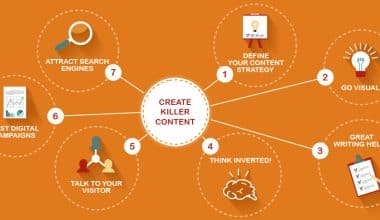Conversational marketing transforms how companies communicate with their customers. Businesses can design meaningful and productive user experiences by utilizing chatbots and tailored conversations. Personalized interactions and improved user experience are made possible by the effective tool of conversational marketing. Businesses can tailor the buyer journey using conversational marketing software, identify potential customers across various platforms, respond to their concerns, and point them in the direction of the appropriate salesperson or product page to complete the transaction.
The advantages of conversational marketing will be covered in this blog, along with tips on how to use it to expand your company.
Conversational Marketing
A strategy known as conversational marketing engages customers in real-time conversations on the channels they already use, such as live chat, mobile messaging, AI, and NLP/NLU, to help them throughout their buying process. This fosters stronger relationships with clients and opens up new avenues for engagement and conversion. The main goal of conversational marketing is to integrate technology and human practices. The basis of this strategy is feedback. It supports the procedure and aids businesses in adjusting their marketing tactics to meet the needs of customers.
Shortening the sales cycle, learning more about customers, and fostering a human buying experience are all goals of conversational marketing, an approach driven by real-time dialogue. It involves an audience in a feedback-focused strategy that boosts engagement, revenue, and customer loyalty.
Conversational Marketing Examples
Here are some typical examples of conversational marketing from various sectors of the economy.
#1. Live Assistance
The availability of live support has a big impact on how your customers feel about your company. The conversational marketing approach needs to provide lots of help. Integrating round-the-clock helplines, price matching, or a dedicated Twitter “help” account are all ideas to delight your customers. In essence, providing excellent customer service will increase sales.
#2. Voice Assistance
Use a voice assistant to interact with customers, such as Alexa or Google Assistant. Through the use of voice technology, they increase interest in your product. This is a particular type of product marketing. Because you might not be able to convey the message you intended to, texting occasionally fails to reach the intended audience. A voice-assisted program or app could fix this issue.
#3. Live Chat
One of the most popular forms of customer service today is this one. They engage the audience in conversation to allay concerns and gain support. To communicate with clients, they engage with them on a variety of platforms, including Facebook, Twitter, and Instagram.
#4. Chatbot
The chatbot uses the AL software to interact with customers through their brand’s website, SMS, and other social media platforms. Chatbots can respond to questions with insightful comments, giving the audience the impression that their issue has been resolved.
The chatbot’s primary benefit is that it is accessible around the clock. Because chatbots are programmed automatically, they can only respond to certain questions.
#5. Post-Sale Communication
The most typical practice is to send customers follow-up emails to see how they are enjoying their purchase and to see if they have any questions. Although it might seem insignificant, you should still do it because it could increase the likelihood that they will make another purchase from you. Businesses follow up with customers to make sure they benefit from their purchases.
#6. Email Marketing
It is possible that when you think of conversational marketing, email marketing is not what comes to mind. However, it still has a chance of working. It is common knowledge that some businesses have misread emails. They finally give up and start distributing newsletter after newsletter, which fails to engage the audience. Think about including a survey in your email to ask recipients how they feel about a certain product or include bad, ok, and great smiley emoticons for them to choose from. Customers will communicate with you more frequently if you make it simpler for them to do so.
#7. Personalization
Personalizing your customers’ experiences is a great way to use conversational marketing. If your company sells hair care products, for example, you could give your customers a quiz to determine their hair type and needs before recommending the best product.
Benefits of Conversational Marketing
Marketers can increase acquisition, skyrocket conversion rates, deepen customer loyalty, and increase engagement throughout the entire customer lifecycle by enabling consumers to get their questions answered, respond to marketing messages, and converse with brands in real-time as friends.
#1. Reveals Useful Information About Customers
One of the best methods for discovering your customers’ preferences is conversational marketing. They speak with you directly, giving you the chance to gather important insights that can be applied to enhance your processes, goods, interactions with customers, and content.
#2. Increasing Customer Experience
Traditional marketing strategies frequently involve one-way communication, in which companies impose their messages on consumers. Conversely, two-way conversations made possible by conversational marketing let customers take an active part. This interactive strategy gives clients a more engaging and enjoyable experience.
#3. Builds Strong Relationships
Businesses can communicate with their audiences through a variety of channels and give them a quicker way to get in touch with them by using conversational marketing. Building strong customer relationships will be made easier by offering genuine experiences with a human touch.
Sending a support ticket and waiting for a response can be a time-consuming and aggravating process for teams, particularly when dealing with customer support issues. Real-time responses speed up issue resolution, but they also may encourage new prospects to make more purchases as they go through the buying process.
#4. Provide a Boost to the Sales Funnel
Businesses can quickly recognize high-quality leads as they arrive when conversational marketing is used as a tactic and can exchange details that are essential to the selling procedure. This might result in a conversation that boosts conversions and shortens the sales cycle.
#5. Enhanced Customer Experience, and Collection of Useful Client Data
Through conversational marketing channels, businesses can assist and answer customers’ questions in real-time throughout their entire purchasing process. Zero-party data gleaned from conversations also aids businesses in furthering the enrichment of customer profiles and improving CX and subsequent interactions with useful recommendations and deals.
#6. Boosts Levels of Engagement
Customers can access your information panel directly through interactive tools when you enable one-on-one interactions with them. Customers are more likely to engage with your communication channels if your product is better suited to their requirements.
#7. Improved Brand Loyalty and Deeper Customer Relationships
Conversational marketing channels aren’t only a great way to provide quick and helpful answers to customer queries, they’re also highly personal. Meeting your customers on the channels they use to communicate with friends and family is an opportunity for your brand to build more meaningful relationships, and in turn, drive more loyalty.
#8. Cost Savings
Up to 90% of customer interactions can be automated by brands using conversational AI and automation, resulting in improved human resource allocation and cost savings.
#9. Increasing Sales
Conversational marketing is a potent sales tool in addition to being about engagement and experience. Businesses can raise average order values, raise conversion rates, and ultimately accelerate the growth of sales by using conversational marketing.
Conversational Marketing Software
Messenger marketing software, also referred to as conversational marketing software, increases customer conversion rates by engaging prospective customers in tailored, one-on-one conversations that lead to specific product recommendations or offers. Sales departments can create thoughtful response flows by utilizing a built-in chatbot and artificial intelligence technology. Based on user activity and other information, this will lead visitors through useful conversations at different touchpoints.
Then, by getting in touch with interested clients who delay making a purchase, businesses can carry on the conversation. Conversational marketing software aid in delivering a higher level of customer service at scale and streamlining the overall purchasing process for potential clients around the globe at any time of day.
How Do Conversational Marketing Software Operate?
Chatbots and live agents are used by conversational marketing software to have one-on-one conversations with customers. Customer engagement and conversion rates are increased by the software’s ability to understand customer inquiries and provide responses using natural language processing and AI. Additionally, it gathers consumer information and behavior, enabling companies to target their marketing campaigns. In the end, conversational marketing software facilitates communication, raises client satisfaction, and stimulates sales.
Benefits of Conversational Marketing Software
#1. Increased User Engagement
Utilizing conversation marketing software, publishers can have personalized, interactive conversations with their audience that increase user engagement and retention.
#2. Enhancing Conversion Rates
Conversation marketing software can assist publishers in increasing their conversion rates, which may result in more money being made from their content. This is done by enhancing and personalizing the user experience to make it more appealing and engaging.
#3. Useful User Insights
Conversation marketing software can offer publishers insightful data on the preferences, interests, and behavior of their audience by monitoring user behavior, engagement, and conversion rates.
#4. Enhanced Client Satisfaction
Publishers can give their audience a more tailored and seamless experience with conversation marketing software, which will increase client satisfaction. Publishers can develop a devoted customer base and enhance their reputation by providing tailored recommendations, responding to inquiries immediately, and meeting customer needs quickly.
#5. Increased Efficiency
Conversational marketing software helps publishers run their businesses more efficiently by automating particular tasks like lead generation, lead nurturing, and customer service. As a result, publishers may have more time and money to devote to producing high-quality content and enhancing their overall marketing plan. Publishers can also make data-driven decisions and maximize the effectiveness of their campaigns with the help of the useful insights the software offers.
Best Conversational Software
#1. HubSpot
AI software for clever businesses. You can maximize the effectiveness of your sales and marketing efforts by using conversational marketing. It aids in the development of bots that offer a customized experience. The software provides a range of advertising tools, such as conversational intelligence software, live chat, social media management, SEO, and ad tracking.
HubSpot uses algorithms to take notes automatically, giving business owners a thorough understanding of the team’s phone conversations. Getting in touch with website visitors in real time is simple with this free live chat tool. You have a chance to turn visitors into repeat customers, increase sales, and improve client service by engaging them in conversation.
#2. Drift
This gives you conversational marketing tools that enable you to improve your connections with leads and, as a result, your business growth. It helps you have personalized conversations at scale with prospects. Drift enables businesses to have the appropriate conversation with customers at the appropriate time, place, and place.
Businesses can personalize experiences that result in a greater quantity of high-quality leads, revenue, and devoted customers by utilizing our Conversation Cloud powered by AI. The Conversational Marketing category and Drift were introduced in 2015 by co-founders David Cancel and Elias Torres to address issues with conventional B2B marketing and sales.
Drift is a cloud-based service created to assist companies in automating sales processes by including live chat windows on websites for improved user experience and patronage. A few of the most important features are proactive chat, transfers, geo-targeting, offline access, and chatbots. To help generate leads and enhance sales opportunities, Drift makes it easier to communicate with website visitors in real time. An integrated chatbot is part of the AI-enabled solution, which automates marketing pipelines and boosts customer engagement. Furthermore, it enables marketers to produce reports that will aid in decision-making and enhance business performance.
#3. ActiveCampaign
A single, user-friendly platform called Active Campaign unifies all facets of email marketing. Create stunning and captivating emails effortlessly, distribute them to segmented subscribers, and track in real time the interactions and responses that result! Email marketing is still one of the best marketing strategies for generating a profit. Digital marketing companies can easily and effectively communicate with leads or existing customers who require advice and support using Conversations, the company’s conversational tool.
Additionally, ActiveCampaign provides you with the best channel for customer interaction by displaying real-time contact information. Setting up an automated flow to gather information and find out useful information about your clients is simple with chatbots.
#4. Intercom
Intercom is an actual game-changer. Software for conversational marketing allows for quick integration of brand client messages and real-time delivery of emails and notifications to customers. It is a huge plus that the platform is very customizable. Another language, dark mode, saving customized views, and other options are available to users. Because it includes several useful collaboration options, the platform has the functionality of online collaboration software. To improve operations, you can make use of features like live dashboards, reporting, work management tools, and others.
Intercom is the only all-encompassing customer service solution that offers a seamless customer experience across automation and human support, boosting customer satisfaction while cutting costs. We are working to create a world in which the majority of customer service interactions can be resolved successfully without the assistance of a human, freeing up the team to focus on more important customer service interactions. Utilize AI, bots, and rules to lower support costs by relieving your team of tedious tasks and questions. Only high-value questions are handled by service teams, and the inbox is quick, user-friendly, AI-powered, and collaborative.
#5. Birdeye
For local companies and brands, Birdeye is the best-rated all-in-one platform for reputation management and customer service. With the help of Birdeye’s all-in-one platform, more than 100,000 businesses can easily manage their online reputations, connect with prospects through digital channels, and understand the experiences of their customers to boost sales and thrive.
For local companies and brands, Birdeye is the best-rated all-in-one platform for reputation management and customer service. Over 100,000 businesses utilize Birdeye’s all-in-one platform to manage online reputation, communicate with prospects through digital channels, and gather information about customer experiences to grow and prosper. enables users to gather reviews, monitor customer feedback, and access reports from any location via a mobile app for iOS and Android.
Data on customer feedback gathered from surveys, social media, and review sites in real time can be used by users to make informed decisions. Users can assess their position in the market by using Natural Language Processing (NLP) technology, which gives them real-time competitive insight into competing review sites and social media platforms.
#6. Customers.ai.
The best AI platform for automating B2C data prospecting and sales outreach is called Customers.ai. Included in the key features are the ability to contact anonymous website visitors via email, automation tools for sales outreach that are pre-formatted, integrations with thousands of business productivity tools, and hundreds of millions of consumer records for use in creating email outreach campaigns for any audience. Over a million companies worldwide, in every industry and nation, use the sales outreach automation from Customers.ai.
#7. Conversica
Conversica uses conversational AI to build the biggest augmented workforce ever. We personalize every interaction. This company is the top provider of Conversational AI, assisting businesses in acquiring new clients and increasing revenue throughout the customer lifecycle. A conversational AI solution called Conversica helps enterprise revenue teams bring in, pick up, and grow customers throughout the customer journey via email, SMS, and website chat. It offers AI Assistants that support teams in discovering new revenue opportunities while also increasing workforce capacity, boosting your sales teams’ performance at the lowest possible cost.
#8. Landbot
With Landbot.io, businesses can create frictionless conversational experiences without having to write any code. Landbot helps marketing, operations, and customer service teams increase productivity and cut operating costs by automating conversations in a way that mimics human interaction. Using automated chatbot flows on WhatsApp, the web, or Messenger, anyone can improve customer engagement and boost conversion rates.
The wealth of pro-level features it offers, such as no-code development, on-screen chats, pre-configured bots, conversation analytics, tracking and optimizing data, etc., make it a viable alternative to instant messaging software.
The platform enables the creation of chatbots for landing pages, WhatsApp, or business applications in a variety of formats, such as pop-ups, widgets, live chat, and more. Additionally, a tool for software customization, as well as an API, are accessible, allowing businesses to freely adapt the program to their requirements and preferences. In addition, Landbot is compatible with a wide range of external programs, including Mailchimp, Stripe, Google Sheets, Zapier, Slack, and Salesforce.
#9. Qiscus
Qiscus is also an effective cloud-based customer communications management tool that gives businesses access to customer data, leads, omnichannel CRM, and customer engagement operations. Users can create a single view of the entire organization’s sales funnel so they can respond to leads and prospects more successfully, boost sales performance with real-time notifications and alerts, automate tedious tasks, and save time with intelligent automation.
What is Conversational Marketing?
In essence, real-time, one-on-one conversations across various channels are the foundation of conversational marketing. By interacting with customers online and customizing your interactions, you can strengthen customer relationships and enhance your online customer experience.
What Are the Types of Conversational Marketing?
- Chatbot
- LiveChat
- Voice assistant
- Social media
Why Is Conversational Marketing Effective?
There is increase in customer engagement, which is one of the main advantages of conversational marketing. Direct marketing is one-way talks down to consumers, whereas two-way messaging encourages interaction. Rich media usage in messaging creates a chance to initiate and conclude the sales cycle. Teams in sales and customer service can interact with prospects on a more personal level thanks to conversational marketing. Furthermore, when the conversation is more individualized for the user, this establishes a strong foundation for the relationship.
What Are Conversational Marketing Tools?
Messenger marketing software, also referred to as conversational marketing software, increases customer conversion rates by engaging prospective customers in tailored, one-on-one conversations that lead to specific product recommendations or offers. Businesses can also build intelligent response flows that direct visitors through helpful conversations at various touchpoints based on their behavior and other information by utilizing chatbots and artificial intelligence, which can be combined to form a single system.
What Are Conversational Strategies?
A conversational marketing growth strategy uses chatbots, live chat, voice calls, and video to engage website visitors in real-time sales conversations. If also used with a sound strategy, this method decreases buyer friction, boosts web conversions, and speeds up sales cycles. Conversational growth strategies aim to get rid of these impediments to increase pipeline and revenue. They immediately start meaningful, brief, and sincere conversations. They further permit sales-ready leads to move swiftly through smooth sales cycles on their schedule and terms.
What Are the 4 Conversational Skills?
- Listening
- Non-verbal communication
- Emotion control
- Clear communication
Conclusion
Conversational marketing has changed the game for businesses operating online by allowing them to engage clients in personalized conversations that enhance the client experience and increase revenue. Businesses can interact online with potential customers about their goods and services by using conversational marketing software.
In summary, publishers who want to engage with their readers in tailored conversations should spend money on conversation marketing tools. Publishers can select a software solution that fits their specific requirements by taking into account aspects like user-friendly interfaces, NLP and AI capabilities, integration options, customization features, and cost-effectiveness.
Related Articles
- How Customer Support Can Increase Customer Satisfaction
- CONVERSATIONAL AI: Best AI, Examples, Companies, Guide & Course
- AI COMPANY: Top 11 Best Artificial Intelligence Companies 2023






